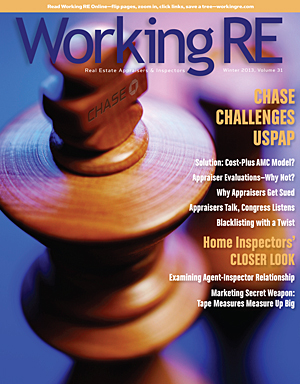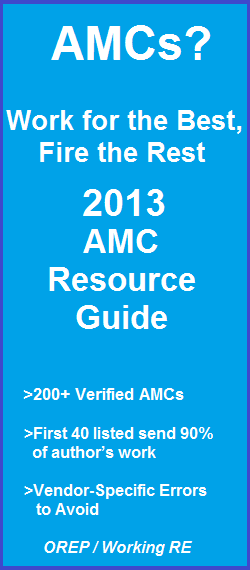
|
Published by OREP, E&O Insurance Experts | February 20, 2013 |
"Scope
Creep
is another of those recently coined phrases- like
checkbox
chips- born from appraiser frustration
at doing more work for less money and diminished professional respect."
Editor's Note:
We introduce today our new Editor’s Pick
News Edition- one
content-driven story a month intended to bring you tools, tips and information
to help you grow as a professional and succeed as businessperson.
You’ll find original reporting, fresh
stories, and as always, an honest voice for appraisers. Thanks for
reading.
Editor's Pick: Scope Creep
by David Brauner, Editor
Scope Creep
is another of those recently coined phrases- like
checkbox chips-
born from appraiser frustration at doing more work for less money and diminished
professional respect.
The reasons and remedies vary.
What seems to bother appraisers most these days, even
more than low fees, are what they consider to be "unnecessary" challenges to
their reports by AMC staff who, in many instances, appear to be less than
qualified. Appraisers say this bogs down the process and negatively
affects their efficiency and profitability; not to mention delaying or killing
deals. Some of the behavior is in violation of state and federal
regulation, according to experts.
Appraisers complain of being inundated by
“irrelevant” requests, like instructions to re-label photographs, additional
alternative street scenes or having to explain the obvious – like whether a
porch is covered.
“Bracketing of unadjusted comps around final
appraised value is one of my favorites,” said appraiser
David L. Phillips, SRA.
“This would require you knowing what the appraised
value is before you even do the work.”
Phillips
“likes” this request too:
a minimum of three comps and two competitive listings
on each report. “If I have competitive
listings, I put them in but if I don’t, there is no reason to just fill in the
grid with meaningless properties,” says
Phillips.
Appraisal management companies (AMCs) defend their quality control requests,
arguing that if appraisers did their jobs correctly the first time there would
be no back and forth; good appraisers don’t have this problem they say.
They say the profession suffers from an army of appraisers who never
get proper training. Observers
surmise the additional “stips” (stipulations) are coming straight from lenders
who are tightening oversight to avoid problems from zealous regulators, who
themselves are under pressure because of Dodd Frank.
Long time appraiser
Jo Ann Meyer Stratton, IFA, SRA
has this take: “The biggest reason for scope creep today, compared with the
past, is that before the rise of AMCs, underwriters who comprehended
appraisals were reading the actual reports and asking logical questions.
Now we have ‘checkers’ (not reviewers or experienced underwriters or
appraisers) comparing a list to just parts of the report and not bothering to
read the comments in between. Prior to AMCs, I only heard from
underwriters about every three to five years. As soon as AMCs were
inserted into the system, with their minimally-trained ‘checkers,’ I started
hearing questions for things already in the report. Or they wanted the
information stated twice or asked for information that was not applicable to the
appraisal assignment. I have always written very detailed reports, so 99
percent of the time the information the ‘checkers’ are looking for is right in
front of them,” Stratton says.
Stratton says her reply to these requests typically reads something like: See
paragraph two on page two of the original Expanded Comment Section under Sales
Comparison Report or see the exhibits, sketch and photos in the original
report.
Review of Additional Sales
But is it Legal?
Darwin Ernst, SRA says, “The increase in the scope of work from the lending
industry for residential mortgages is unyielding and without any consideration
for additional compensation to the appraiser. I wonder why many lenders and
their brokers (AMCs) now think that they must dictate what is required to
produce a credible appraisal report, rather than allowing the supposed
‘independent’ appraiser to choose what to include. How long will appraisers be
required to grid listings in the sales comparison approach, when they are not a
part of a SALES comparison approach to value? Most appraisers know when to
analyze listings and pending sales to support their concluded opinion of value
but the trend by lenders and their brokers to request the additional listing
data for every assignment, regardless of its contributory value to the concluded
opinion of market value, is a contentious issue among professionally licensed
appraisers. The increased scope of work is extremely labor intensive for
appraisers and yet there is no additional compensation even considered by the
lender, or their brokers.”
A common issue for appraisers is a request
from an AMC to review additional sales.
The report has been reviewed already by the AMC and compensation paid.
Appraisers ask themselves two questions when this happens: shouldn’t they get
paid for the extra work and, in certain cases, isn’t telling an appraiser how to
appraise unlawful under new appraiser independence laws?
Some appraisers receive additional fees for these after-the-fact requests- the
key they say is to ask. But many appraisers say they don’t have a choice,
depending on the AMC they are working for.
Many AMCs require compliance with language, such as the following, in
their engagement letter:
appraiser will agree to answer/fulfill all requests with ANY questions from the
Client by accepting this assignment.
Some appraisers try to preempt the problem by including language of their own,
such as: I
selected and used comparables that are locationally, physically and functionally
most similar to the subject property. No reasonable sales that are closer or
more recent are available, and requests for additional comps will not be
complied without additional compensation to the appraiser. Any provided would
not be more comparable regardless, since the best comps have already been
provided.
Another complaint is that these onerous “stips” are not stated up front when the
appraiser accepts the assignment. This
causes confusion, according to appraiser Deborah Gedney. “If
there are specific lender requirements about the type of comps the lender needs
to meet their underwriting qualifications (i.e. two minimum, within 90 days,
within one mile, etc.), then for Pete's sake, tell us up-front in the assignment
contract when we still have the option to decline the order,” Gedney said.
“Most of us will do everything we can to
meet those criteria if at all possible. But telling us after the fact and then
expecting us to waste our time working for free, to meet criteria that should
have been defined up front, is scope of work creep that is costly to us,
annoying, and completely preventable.”
Talk to AMCs and you’ll hear the other side of the story: they
rail about a lack of professionalism among appraisers; not showing up for
appointments, not completing conditions for weeks, not communicating and worse.
AMCs are not the only ones with “do not use” lists, however.
More and more appraisers have lists of their own and refuse to work for
less than reasonable fees or in too short a timeframe (Survey
Results: How Reasonable Are Appraisal Turn Times? And is Quality Effected?).
Like so many issues, appraisers are considering the quality of the
relationship when deciding customer service issues such as what fees to accept,
when to say yes and when to say no to underwriting requests.
While the need to make tough business decisions isn’t new, appraisers say
it was much less risk to fire clients in the old days than it is today because
recent consolidation of lenders/AMCs has left far fewer appraisal order sources.
Richard Hagar, SRA, says that most of the additional comparables his appraisal
firm are asked to consider appear to have been selected based on their value and
are extremely biased towards a higher value conclusion. This is an issue that
many appraisers immediately recognize as an attempt at influence, but the
requesting party often doesn’t see it that way.
In many cases, the client’s request to analyze additional comps is coming from
someone who is not a licensed/certified appraiser in the state where the
property is located. “We’re talking about underwriters or others who don’t have
appraisal expertise and yet insist on getting involved in the appraisal process.
They are attempting to perform the appraiser’s job,” says Hagar.
Hagar, who presents the OREP/Working RE webinar
Appraisal Review and the Law
covering these issues, says that it is very rare for a request for
additional comps to include any properties that he hasn’t already considered,
but when there is a legitimate comp that he missed, he’s happy to consider it.
For the vast majority of other cases he refuses play their game.
“For comp requests, I usually tell them directly that their suggestions are not
comparables so I won’t consider them. Or that they were already considered in
the original scope of the assignment, and they aren’t comparable,” says Hagar.
“I don’t need to write out long explanations. They ask a simple question, so I
give a simple answer, in writing!”
Ernst, who served six years as
Chair of the Montana Real Estate Appraiser Board's Adjudication Panel,
says that
each state regulatory agency has the responsibility to license and adjudicate
complaints against AMCs, and they will be the final judges on whether the AMC is
adhering to its state's AMC law. Most of the current AMC laws follow the
appraiser independence provisions within the Truth in Lending Act, as amended by
the Dodd-Frank Act, very closely, he says.
“I would advise every appraiser to take the time to check their state's AMC law
(if they have one in their state) before they make a decision of what is (and
what is not) appropriate for a lender to ask of their panel appraisers.
Personally, I believe every time the appraiser perceives pressure from the
lender (or its agent, the AMC) to alter his/her opinion of value, there is a
potential for a legitimate complaint from the panel appraiser to the AMCs
regulatory agency. However, make no mistake about it, the AMCs regulatory agency
will be responsible for deciding whether the complaint has any merit, and if it
does, which action(s) they might take against the AMC,” says Ernst.
Hagar concludes, “Sometimes the request is legitimate. If, for example, a photo
isn’t relevant to the appraisal, then the appraiser should comply with the
request to remove it. But if the appraiser thinks that it’s valid- a legitimate
photo that is relevant to their report, then the response to ‘remove the
photograph’ should be ‘no.’ The client doesn’t get to tell the appraiser how to
do his/her job. Attempting to mold the appraisal report to tell the appraiser
how to alter it is in violation of state and federal law,” says Hagar. “If the
lender or client has particular needs about what photos they require, then that
should be made clear up front, in the scope of work agreement before the
appraisal is created or delivered. However, the majority of additional requests
to alter a report after the fact are clearly attempts at influence
and coercion.”
Thanks to AppraisalBuzzForum.
Upcoming Webinars:
This
March, Richard Hagar will present a two-part Webinar Series:
Appraisal Review and the Law and
Lender or AMC: Who's Responsible for Paying Appraisers? In these
webinars, Hagar shows appraisers what they need to know to stay out of trouble and how to
respond properly against illegal requests. Hager also sets the
record straight on what the lender’s responsibility is to the appraiser
when it comes to collecting fees, giving
appraisers the information they need to fight back when lenders and AMCs fall
short. Click here to
sign up.
>
ATTENTION: You are receiving WRE Online News because you opted in at WorkingRE.com or purchased E&O insurance from OREP. WRE Online News Edition provides news-oriented content twice a month. The content for WRE Special Offer Editions is provided by paid sponsors. If you no longer wish to receive these emails from Working RE, please use the link found at the bottom of this newsletter to be removed from our mailing list.




